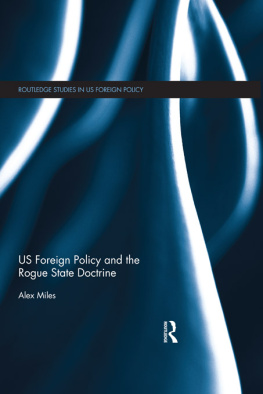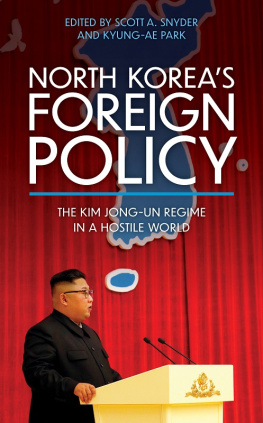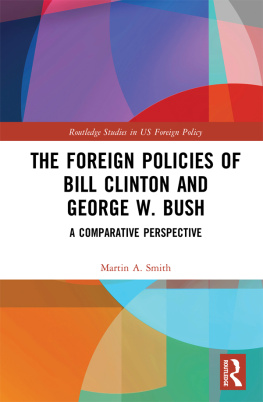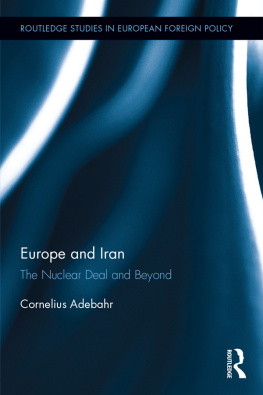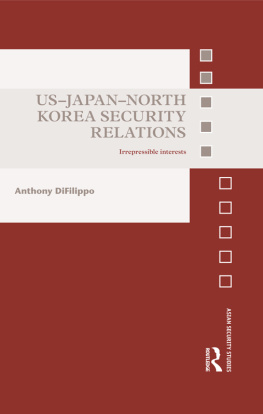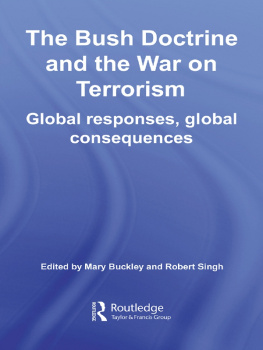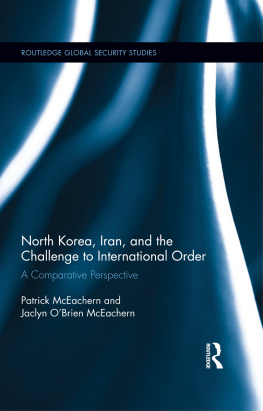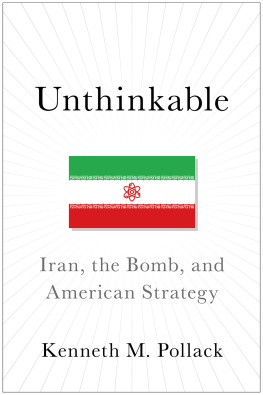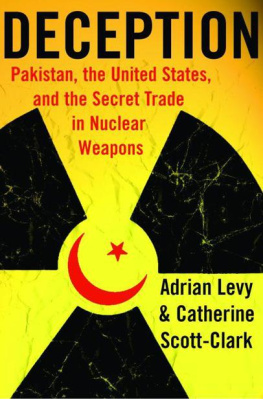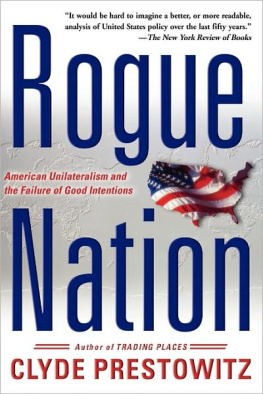US Foreign Policy and the Rogue State Doctrine
Concerns over Irans nuclear programme, North Koreas nuclear brinkmanship and, in the past, Iraqs apparent pursuit of weapons of mass destruction (WMD) have captured the worlds attention, and dominated the agenda of the American foreign policy establishment. But, what was it that led policymakers and the US military to emphasise the threat of rogue states at the end of the Cold War?
Going behind the vivid language of the axis of evil and portrayals of undeterrable and reckless rogue states, this work demonstrates how the rogue state doctrine satisfied both domestic and international goals in the Clinton and George W. Bush administrations, underpinning efforts to maintain US leadership and hegemony. It offers a clear picture of the policymaking process, taking a broad, historical approach that places the actions of US officials towards Iraq, Iran, North Korea, Libya and Cuba in a wider context. Through an understanding of the long-standing influences upon the US approach we are better able to appreciate why, for instance, regime change dominated the post-9/11 agenda and led to the overthrow of Saddam Hussein. Explaining in detail how the tackling of rogue states became a central aim of US foreign policy, Miles examines whether there was continuity between the Clinton and Bush approaches. He goes on to highlight the influence of Congress on the implementation of US policies, and the difficulties the US faced in selling its approach to allies and adapting its hard-line strategies to reflect developments within the targeted states.
By considering the impulses and drivers behind the development of the rogue states approach, this work will extend the scope of existing work in the field and will be of interest to scholars and policymakers alike.
Alex Miles is a senior lecturer at Liverpool John Moores University where he specialises in contemporary American foreign policy and politics.
Routledge studies in US foreign policy
Edited by Inderjeet Parmar
University of Manchester
and
John Dumbrell
University of Durham
This new series sets out to publish high quality works by leading and emerging scholars critically engaging with United States Foreign Policy. The series welcomes a variety of approaches to the subject and draws on scholarship from international relations, security studies, international political economy, foreign policy analysis and contemporary international history.
Subjects covered include the role of administrations and institutions, the media, think tanks, ideologues and intellectuals, elites, transnational corporations, public opinion, and pressure groups in shaping foreign policy, US relations with individual nations, with global regions and global institutions, and Americas evolving strategic and military policies.
The series aims to provide a range of books from individual research monographs and edited collections to textbooks and supplemental reading for scholars, researchers, policy analysts, and students.
United States Foreign Policy and National Identity in the 21st Century
Edited by Kenneth Christie
New Directions in US Foreign Policy
Edited by Inderjeet Parmar, Linda B. Miller and Mark Ledwidge
Americas Special Relationships
Foreign and domestic aspects of the politics of alliance
Edited by John Dumbrell and Axel R Schfer
US Foreign Policy in Context
National ideology from the founders to the Bush doctrine
Adam Quinn
The United States and NATO since 9/11
The transatlantic alliance renewed
Ellen Hallams
Soft Power and US Foreign Policy
Theoretical, historical and contemporary perspectives
Edited by Inderjeet Parmar and Michael Cox
The US Public and American Foreign Policy
Edited by Andrew Johnstone and Helen Laville
American Foreign Policy and Postwar Reconstruction
Comparing Japan and Iraq
Jeff Bridoux
Neoconservatism and American Foreign Policy
A critical analysis
Danny Cooper
US Policy Towards Cuba
Since the Cold War
Jessica F. Gibbs
Constructing US Foreign Policy
The curious case of Cuba
David Bernell
Race and US Foreign Policy
The African-American foreign affairs network
Mark Ledwidge
Gender Ideologies and Military Labor Markets in the U.S.
Saskia Stachowitsch
Prevention, Pre-Emption and the Nuclear Option
From Bush to Obama
Aiden Warren
Corporate Power and Globalization in US Foreign Policy
Edited by Ronald W. Cox
West Africa and the US War on Terror
Edited by George Klay Kieh and Kelechi Kalu
Constructing Americas Freedom Agenda for the Middle East
Oz Hassan
The Origins of the War on Terror
Lebanon, Libya and American intervention in the Middle East
Mattia Toaldo
US Foreign Policy and the Rogue State Doctrine
Alex Miles
First published 2013
by Routledge
2 Park Square, Milton Park, Abingdon, Oxon OX14 4RN
Simultaneously published in the USA and Canada
by Routledge
711 Third Avenue, New York, NY 10017
Routledge is an imprint of the Taylor & Francis Group, an informa business
2013 Alex Miles
The right of Alex Miles to be identified as author of this work has been asserted by him in accordance with the Copyright, Designs and Patent Act 1988.
All rights reserved. No part of this book may be reprinted or reproduced or utilised in any form or by any electronic, mechanical, or other means, now known or hereafter invented, including photocopying and recording, or in any information storage or retrieval system, without permission in writing from the publishers.
Trademark notice: Product or corporate names may be trademarks or registered trademarks, and are used only for identification and explanation without intent to infringe.
British Library Cataloguing in Publication Data
A catalogue record for this book is available from the British Library
Library of Congress Cataloging in Publication Data
Miles, Alex.
US foreign policy and the rogue state doctrine / Alex Miles.
p. cm. (Routledge studies in US foreign policy)
Includes bibliographical references and index.
1. United StatesForeign relations1989 2. Security, International.
I. Title. II. Title: United States foreign policy and the rogue state
doctrine.
E183.7.M55 2012
327.73dc23
2012028248
ISBN: 978-0-415-67974-9 (hbk)
ISBN: 978-0-203-07198-4 (ebk)
Typeset in Times New Roman
by Wearset Ltd, Boldon, Tyne and Wear

